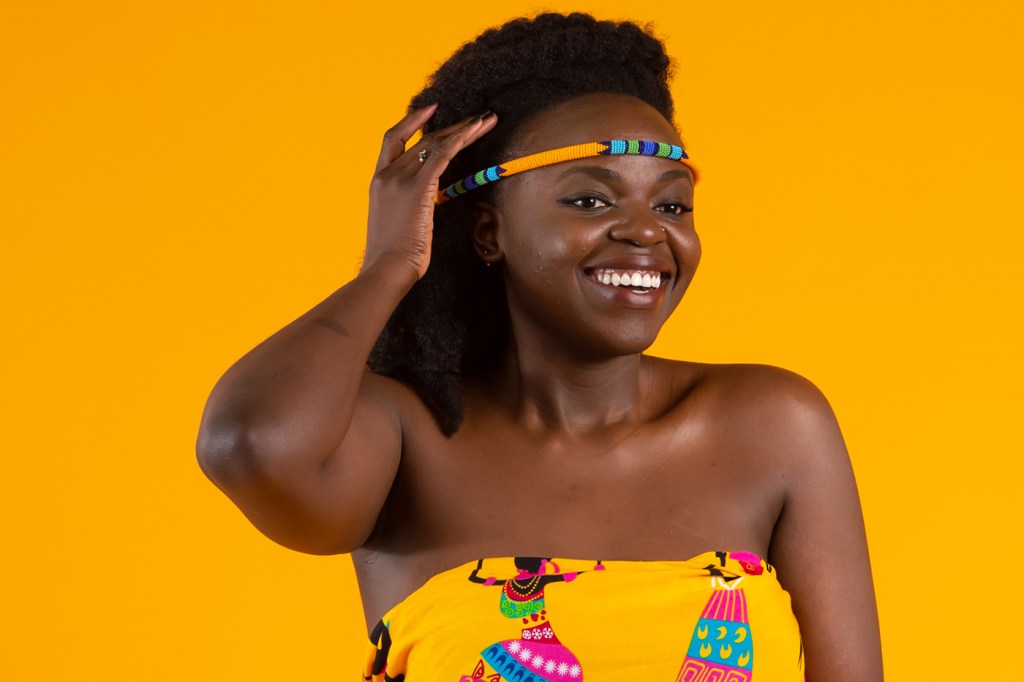Northeastern graduate revolutionizing the beauty industry with AI-powered solutions for women of color
Becky Mashàido’s business venture, KiAsili Naturals, is using science and artificial intelligence to reimagine the future of an inclusive beauty industry.

Becky Mashàido, a software engineer, entrepreneur and Northeastern University graduate, is on a mission to disrupt the beauty industry and help consumers save money.
“The beauty industry is hands-down a multi billion dollar industry yet a majority of the consumers, especially women of color, still struggle to find what works best for them,” she says. “I care about this end user, her experience with finding the right product and the value of her spending power.”
Mashàido gained expertise in software engineering, deep learning and computer vision, which enables computers to recognize objects and people in images, through Northeastern’s graduate computer science program and her subsequent work at Google.
Now, she is developing a tool to help consumers choose personalized hair care and skin care products.
Women end up spending a lot of money on beauty products, Mashàido says, because they don’t know if they will see the results or how their skin or hair will react to the ingredients. It is especially difficult for Black women like herself and other women of color, she says, to find the right products because of the limited number of brands catering to consumers with melanin-rich skin.
“It’s really tough to find such products for skin care and hair, and we end up spending all this money, but it goes to waste, because it doesn’t work for us,” she says.

Her new business venture, KiAsili Naturals, is using science and artificial intelligence to reimagine the future of an inclusive beauty industry that has a deep commitment to community empowerment.
Her efforts were recently recognized with a Northeastern Women Who Empower award.
Mashàido grew up in a marginalized community on an East African island off Zanzibar in the Indian Ocean. The educational opportunities there were limited, she says, especially for girls, who often stayed home instead of going to school.
But Mashàido loved school, especially math, and often rallied other girls in her community to pursue an education. However, at the time, she didn’t know much about computer science.
That changed when she moved to the U.S. for college and majored in applied mathematics. That’s when she was given her first computer.
Despite having no programming background, she quickly developed her skills and fell in love with the possibilities within the field. During her master’s studies at Northeastern, Mashàido focused on deep learning — a subset of AI inspired by neurobiology.
Her research spanned various applications, from medical field to computer vision, robotics, hardware and cybersecurity.
While at Northeastern, Mashàido completed three co-ops — one as a software engineer at Google and two in deep learning at the University of Texas and University of California, Berkeley. She says she enjoyed working at Google, where she built actual systems that impact billions of users.
Featured Posts
Since moving to the U.S., Mashàido says she has struggled to find suitable oils for her natural Afro-textured hair, which has tightly coiled strands and is more fragile than other hair types. At home, her mother used indigenous African oils that kept her hair soft, strong, healthy and easily manageable.
“I tried different products from the mainstream beauty industry, which as expensive as they are, were only watered down versions of African indigenous oils,” Mashàido says. “My hair became dry, brittle, hard to manipulate and growth was stunted.”
So she set out to source the best African oils for herself. She traveled across Africa to find the most authentic ingredients — coconut oil from East Africa, shea butter from West Africa and olive oil from North Africa. She connected directly with women’s cooperatives in different countries that produced the oils using traditional methods.
After her family and friends saw how effective her homemade blends were, they encouraged her to turn them into a business. Her signature hair oil blend became the flagship product of KiAsili Naturals.
The name of the company refers to the practice of returning to where it all began, Mashàido says, and the authentic ways African foremothers cared for their natural hair. KiAsili (pronounced kee-aah-slee) is derived from the root word -asili, which in Swahili and the Bantu language family — a vast group of hundreds of languages used across sub-Saharan Africa — loosely translates to “indigenous,” “of native origin” or “source.”
Each order is freshly handmade, Mashàido says, and financially empowers the African women who harvest the natural ingredients and prepare the oils.
But Mashàido’s entrepreneurial vision didn’t stop at creating high-quality, culturally authentic products. Leveraging her technical expertise and passion for solving real-world problems, she is developing an AI-driven tool to eliminate the guesswork in choosing hair and skin care products.
Using computer vision and deep learning algorithms, the tool will provide users who submit images and videos with tailored recommendations based on their hair structure and specific needs.
“The goal is to eliminate the learning curve so people don’t waste time and money on products that don’t work,” she says.
Mashàido notes that her business is still in its early stages, with processes being refined and a small team handling the daily operations.
“I do everything, from marketing to managing the website. It’s challenging, but I’m driven by the impact I want to make,” she says.
What truly sets Mashàido apart is her commitment to raising more women engineers, scientists and mathematicians globally.
She mentors young Black girls interested in STEM fields both privately and through such organizations as Mvaha wa Chiche (My Little Sister) — a project sponsored by Khoury College that she founded — She Code Africa and Zawadi Africa.
“I never had access to computer science growing up, so I have to change that narrative for the next generation to see better technical advancement and breakthroughs than we do now,” she says. “I mentor girls from elementary through early career, raising the next generation of women leaders in engineering, mathematics, science and computing; all from my own failures and success.”











